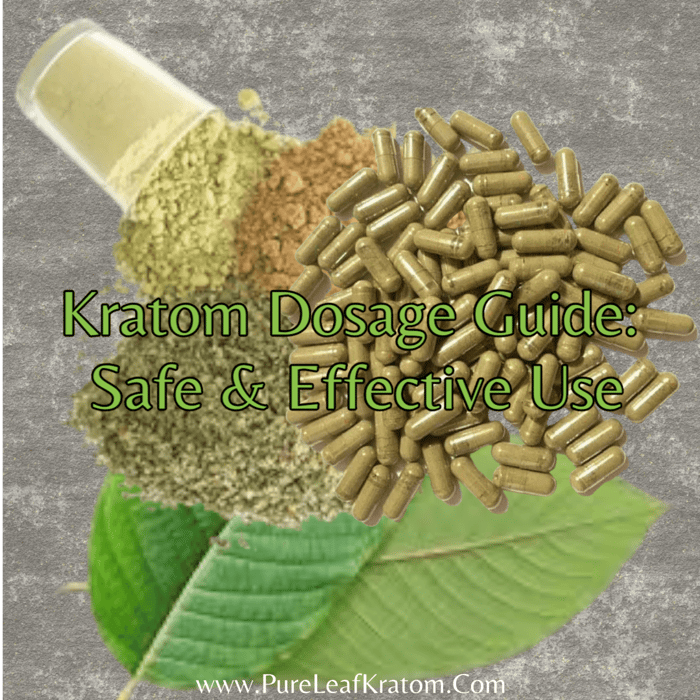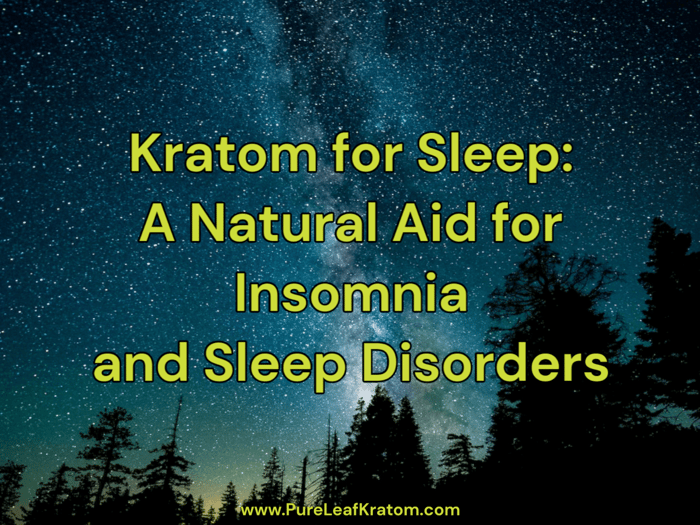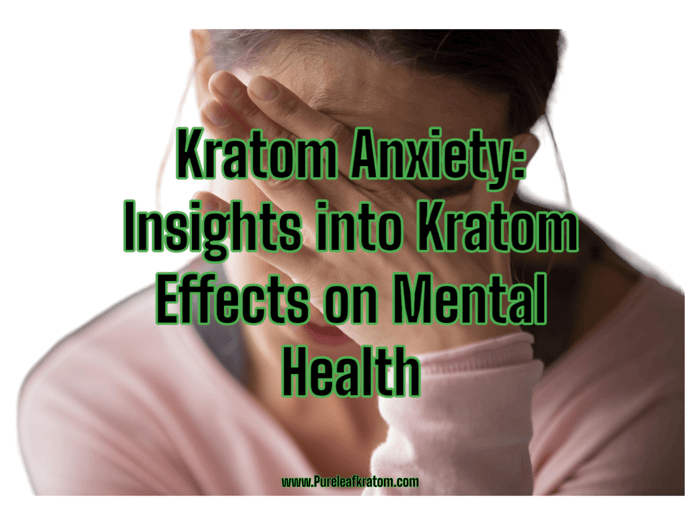
Kratom Anxiety: Insights into Kratom Effects on Mental Health
Unveiling Kratom: A Versatile Herb
If you've delved into traditional medicine or botanicals, you've likely encountered Kratom, scientifically known as Mitragyna speciosa, exploring its potential for anxiety management.
What is Kratom?
Kratom is a tropical tree native to Southeast Asia particularly to regions like Thailand, Indonesia, and Malaysia. In these parts of the world, Kratom holds a cultural significance and is often used in traditional medicine. People chew its leaves, brew it as a tea, or consume it in capsules to combat fatigue and improve work productivity.
Beyond these regions, it's gained attention for its potential use in managing pain, reducing stress, and soothing symptoms of anxiety.
Surpassing Surface: Kratom's Pharmacology
At the heart of Kratom’s effects lie its unique opioid properties which largely stem from two main psychoactive compounds: Mitragynine and 7-Hydroxymitragynine.
Mitragynine and 7-hydroxymitragynine interact with the body's opioid receptors, producing a range of effects which can be stimulating or sedative in nature, dependent largely on the strain of Kratom and the dosage taken.
Understanding Kratom Strains: Energizing vs Sedating
The two primary strains of Kratom are largely differentiated by their distinct effects. The energizing strains, often green or white, are known for their ability to boost energy and focus. On the other hand, the commonly red sedative strains are utilized for their pain-relieving and anxiety-reducing potential, making them a consideration for those seeking herbal alternatives for managing anxiety and mood enhancement.
Kratom's Uses and Legal Status
Kratom’s potential benefits extend beyond pain relief and mood support. Some people have found it useful in addressing addiction or dependence on harsher substances. However, it's worth noting that while people have reported these beneficial effects, there is currently insufficient clinical research to definitively support these claims.
In terms of legality, Kratom’s status varies globally. While it remains legal in some countries, others have deemed it illegal due to concerns about potential side effects and addiction risk. Therefore, it's always best to check the law in your geographic location before considering Kratom use.
Hush Kratom Gummies Extract Infused
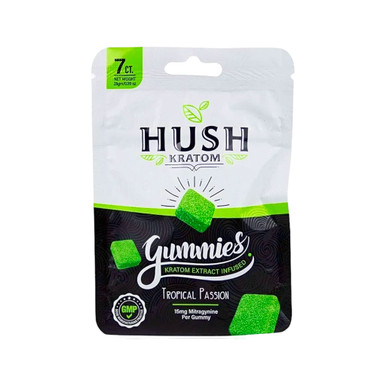
$13.95
Hush Kratom Gummies Extract Infused Hush Kratom Gummies Extract Infused offer a flavorful, easy-to-enjoy way to experience the strength and quality of kratom without the...… read more
Out of Stock
Potential Benefits of Kratom
While the usage and efficacy of kratom, a popular herbal product for anxiety and depression, are still being examined to be strongly based on clinical trials, there are emerging narratives that put forward its potential benefits. Especially, the effects of kratom on neurotransmitters and its role in managing anxiety bears notable mention.
How Kratom Could Help Anxiety
Kratom, scientifically known as Mitragyna speciosa, contains certain naturally occurring psychoactive substances such as mitragynine that interacts with the body's opioid receptors. This interaction is said to induce calming and sedative effects that can aid in relieving anxiety. According to a case study of a 63-year-old man, the daily intake of kratom successfully managed symptoms of anxiety and depression for seven consecutive years, although with limitations during intense stressful situations.
In comparison with traditional anti-anxiety medications, the biased action of kratom on the opioid receptors as indicated in certain studies may offer therapeutic effects with potentially fewer adverse outcomes. However, these findings are mainly based on anecdotal evidence and there is a clear need for more in-depth clinical research to confirm these benefits.
Other Potential Benefits of Kratom
Frequent users of kratom have often reported its potential not just in managing anxiety, but also in other areas. Mood enhancement, for example, is one of the frequently recognized benefits of its usage. In addition, kratom is also considered by some to harbour a potential use in substance withdrawal.
An interesting facet of kratom's potential benefits lies in its supposed capability of providing a sense of calm thus, reducing stress. This calming effect is potentially due to the interaction of kratom's inherent compounds with certain body receptors, resulting in a relaxed state of mind.
Research on Kratom
Despite the flurry of promising anecdotal evidence, kratom's effects on mental health need concrete scientific validation. The lack of substantial clinical trials establishing efficacy therefore indicates that more research is required to study its effects on humans. However, anecdotal evidence and data drawn from self-reports offer several insights into how kratom is being harnessed to combat ailments like anxiety, depression, and even curbing opioid cravings.
Various studies have corroborated these claims, implying that kratom might be beneficial for those dealing with anxiety, particularly in cases related to opioid withdrawal. However, most of these studies were based on animal subjects, lab testing, or relied on online surveys, which may not entirely represent broader kratom use in real-life scenarios.
Tusk Gold Ultra Premium Kratom Liquid Green Apple 150mg
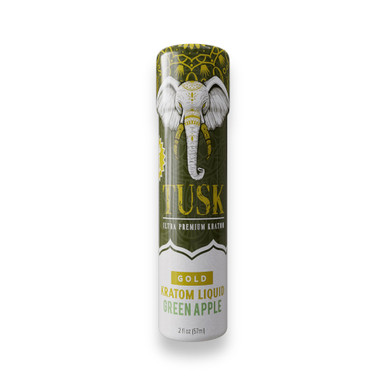
$12.75
Tusk Gold Ultra Premium Kratom Liquid Green Apple 150mg In the realm of botanical indulgence, the Tusk Gold Ultra Premium Kratom Liquid in Green Apple...… read more
Out of Stock
Risks and Side Effects of Kratom
While Kratom, the herbal supplement, is often revered for its potential benefits, particularly in relieving anxiety and reducing stress, a crucial part of responsible use is understanding its potential risks and side effects. These can vary considerably from person to person, depending on factors such as frequency and dosage of use, as well as individual health aspects.
Overview of Common Side Effects
Like any substance, Kratom use can result in a variety of side effects. These effects often depend on the dosage and frequency of consumption. Common short-term side effects usually manifest as gastrointestinal disturbances, such as nausea and constipation, particularly following high dosage or frequent use. Long-term effects are less well-studied, but potentially more severe, including hepatic or cardiac implications and Central Nervous System effects.
Drug Interactions
An important risk factor associated with Kratom use involves its potential to interact with other drugs. This occurs due to the herb's inhibitory effects on certain liver enzymes, which could affect the metabolization of other drugs or substances within the body. This points to the necessity for caution and professional consultation when combining Kratom with other substances.
Potential for Overdose Due to High Doses
High doses of Kratom have been linked with a greater risk of adverse reactions, occasionally raising the risks to life-threatening levels. While it can be tempting to increase dosages, especially when chasing the perceived benefits like mood enhancement and pain relief, such practice dramatically escalates the risk of overdose and subsequent severe health complications.
Risk of Addiction Due to Opioid-Like Properties
Kratom's effects on the body are partly due to its interaction with the body's opioid receptors, hence further research is required to fully understand its addiction potential in comparison to traditional opioids. High frequency and high dosage use can lead to dependence, with withdrawal symptoms that mirror those of opioid withdrawal, further underlining the need for caution and guidance in its use.
Mental Health Risks
Considering its effects on mental health, if an individual with a pre-existing mental health condition uses Kratom, it could exacerbate the symptoms or circumstances of their condition. Complications can arise either from the substance itself or from its withdrawal symptoms, hence, individuals with such histories should approach its use with caution or potentially seek safer alternatives.
[REFERENCES]
- 'Kratom: Unsafe and ineffective'
- 'Patterns of kratom use and health impact in the US—results from an online survey'
[/REFERENCES]
Review of Studies: Kratom for Anxiety
Existing Research Findings
A range of studies have explored the potential benefits of Kratom as an anxiolytic (anxiety-reducing) and mood-enhancing herbal supplement. For instance, an intriguing case report involved a 63-year-old man with major depression and generalized anxiety disorder who leveraged the calming effects of Kratom to manage his symptoms effectively over seven years. It was noted that his daily intake of Kratom not only relieved his anxiety but also improved his sociability and sleep quality without escalating the dose or experiencing side effects typically associated with conventional medicines.
Limitations of Current Research
However, this case also offers insights into the limitations and potential pitfalls of using Kratom for managing anxiety. During the heightened stress period of the COVID-19 pandemic, the standard Kratom regimen was insufficient to manage the man's mental health, indicating that substantial environmental stressors may override Kratom’s effects. Furthermore, the case study, while insightful, lacks the broader perspective that controlled trials with larger sample sizes can offer. This is an inherent limitation of case reports as they cannot establish causality and may not be generalizable. Additionally, the strain of Kratom used, the precise dosage, and how it was consumed are key factors that can affect an individual's experience, making it difficult to draw definitive conclusions.
Pathways for Future Research
The existing evidence suggests that more comprehensive and controlled clinical trials are needed to truly understand Kratom's potential benefits in relieving anxiety and mitigating depression symptoms. Future research can also explore if different strains or doses of Kratom have varying impacts on mental health, and how other variables, like the individual's overall health status, interact with the herbal supplement. Furthermore, studies could delve deeper into the factors that may exacerbate or weaken the effectiveness of Kratom in managing stress and anxiety, such as concurrent life stressors.
Case Study: A 63-Year-Old Kratom User
An example that illustrates the potential benefits and risks of Kratom use can be found in the case of a 63-year-old man who regularly consumed Kratom for over seven years. Within this period, the individual believed that the herbal supplement was helpful in managing his anxiety and depression. This suggests the possibility of Kratom having alleviating effects on anxiety and mood enhancement.
However, it's important to look critically at this example because, despite the potential benefits, there were significant drawbacks. During the period of intense global stress brought about by the COVID-19 pandemic, Kratom proved ineffective in managing the man's distressing mental health symptoms. This suggests that the efficacy of Kratom in anxiety and stress management can be influenced by the level of environmental stressors.
Furthermore, there was indisputable evidence of the risk of becoming dependent on Kratom. Although the man managed to maintain his Kratom dosage without an increase for seven years, illustrating that tolerance did not necessarily build up quickly, he experienced withdrawal symptoms on attempts to stop Kratom use. This points to an undeniable risk of addiction that comes with long-term Kratom use.
The man's quality of life was undoubtedly affected by his Kratom use. While it seemed to provide him with relief from his symptoms of depression and anxiety for a considerable period, his simultaneous inability to cease its use without experiencing withdrawal symptoms is disconcerting. Such situations indicate the potential for a life tethered to the substance, raising questions about the overall impact on an individual's quality of life when using Kratom for extended periods.
In conclusion, this case study underscores the importance of remembering the anecdotal nature of such accounts and the limitations they can possess. More rigorous scientific investigations need to be conducted to elucidate the benefits and drawbacks of Kratom use.
Raw Kratom Capsules White Maeng Da
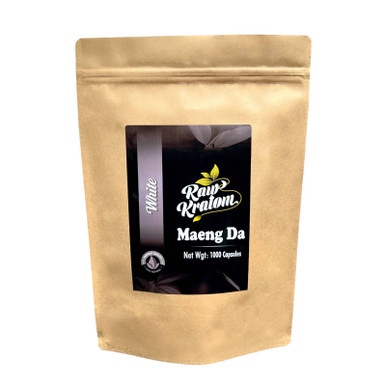
$64.95
Raw Kratom White Maeng Da Capsules Raw Kratom Capsules White Maeng Da, often hailed as the "king" among all kratom strains, is a testament to...… read more
Out of Stock
Dosage Guide and Responsible Use of Kratom
When it comes to using Kratom as a herbal supplement, understanding the potential effects and responsible use are of utmost importance. The plant carries opioid-like effects and can lead to possible addiction or abuse if used carelessly. As such, a carefully planned dosage guide is crucial for safe use.
Suggested responsible use
In administering Kratom, a low dose is often recommended to start. According to various research, doses under 5g of raw Kratom powder lead to stimulant effects, providing a mood enhancement often associated with reducing stress and energizing strains. On the other hand, larger doses between 5-15g result in sedative effects, providing relief from anxiety and pain. Remember: effects typically peak at 2-4 hours and can last between 5-7 hours, but they could persist even longer.
Gradual Adjustment
It's advisable to gradually increase the dose over time, rather than taking a very high dose at once. Abruptly increasing the dose can potentially lead to adverse reactions, raising the overdose risk. Usually, the lowest dose that leads to noticeable effects is considered the person's threshold dose. From there, some may need a higher dose for the same results, as there is a significant variability in the lowest and highest effective doses due to numerous factors such as age, health condition, and personal tolerance.
Consistency in Sourcing
Keep in mind that the potency of Kratom often varies by geographical source, so consistent vendor sourcing is key to ensuring the same effect from each dose. The risk of dependence, tolerance, and withdrawal symptoms is higher with frequent high dose usage. A gradual taper is recommended for those who wish to discontinue use to avoid possible withdrawal symptoms.
Specific scenarios where Kratom should not be used
As beneficial as Kratom may seem, there are situations when it isn't advisable to use this herbal supplement. For instance, usage among individuals with a history of mental health or substance use disorders poses a risk due to Kratom's opioid properties and the potential for abuse. These individuals may face an increased possibility of developing addiction or elevating their existing mental health conditions.
Furthermore, pregnant and breastfeeding women should avoid using Kratom. The lack of comprehensive research into the effects of Kratom use during pregnancy and lactation makes it a potentially risky substance for this group. It's always best to consult with healthcare providers before incorporating Kratom or any other supplement into a wellness regimen.
In conclusion, while Kratom can potentially aid in managing anxiety and reducing stress, its use requires careful attention to dosage and an awareness of personal health history. Only with a responsible approach can one maximize the potential benefits and minimize the risks of using this herbal supplement.
Disclaimer
The products discussed here and any claims or suggestions made have not been evaluated by the Food and Drug Administration (FDA). This content is not intended to diagnose, treat, cure, or prevent any disease.
The information on this website is provided for general informational purposes only and should not be relied on as the sole basis for making decisions – we encourage consulting primary, qualified, more complete, or professional sources. Any reliance on the material on this site is at your own risk.
Information shared on this site may be updated at any time and may include information or data that are no longer current, accurate, or complete and is provided for your reference only. We are not obligated to update published content, and it is the reader’s responsibility to monitor any changes and to consult with primary, qualified, more complete, or professional sources.
We make no guarantees regarding the completeness, accuracy, or reliability of the information provided, nor do we warrant that any products, services, or materials offered will meet individual expectations. Use of this site and its content is at your own discretion and risk.


